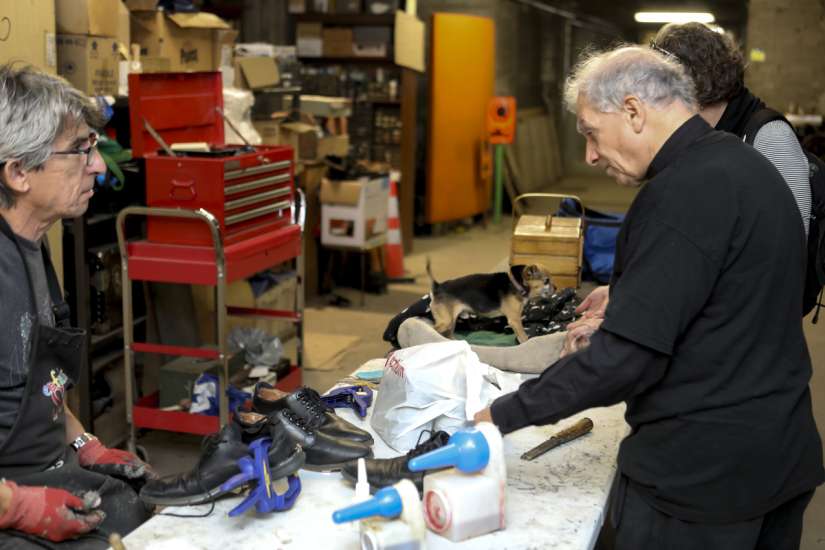The busy priest is parochial administrator at Sainte-Catherine-de-Sienne Parish in the west end neighbourhood of Notre-Dame-de-Grace and Thursday is his day-off, but Couturier calls his makeshift workshop his “liberty spot.”
“I do not think about my parish when I am here,” he says.
The origin story of the charitable side hustle can be traced back to when Couturier was a newly ordained priest at the Cathedral. Some faithful parish ladies came to Couturier to raise concerns about Jean-Paul, a homeless man who spent his days around the church.
“They said ‘Jean-Paul is starting to smell,’ ” remembers Couturier, “and they asked me if I could do something about it.
“Jean-Paul was always in the same running shoes. I took him down to the basement and told him to take off his shoes and it was clear, he had gangrene. I saw that, and I said, okay, ‘Let’s call the ambulance.’ ”
The man was cared for and recovered, but Couturier was prompted to action because of the encounter.
“I didn’t want that to happen to anyone else,” he says.
The result was an initiative that recycles Montrealers’ discarded shoes and distributes them to those in need.
The Cathedral basement where Couturier works, always accompanied by his pocket-sized dog Palou, is a treasure trove. Much of the vast space is taken up by the dismantled remnants of deconsecrated churches — a pulpit covered in tarp, neatly stacked rows of kneelers, an enormous portrait of St. Brother André stacked sidewise against a wall.
But one corner of the vast space holds another category of leftovers — industrial sewing machines, boxes of buttons and laces, sanding belts and a cutter that Couturier demonstrates with an exclamation of pleasure, “This is so good. Look, you just cut.”
All the machines and material have been donated by three cobblers Couturier befriended in his efforts to learn about shoe repair.
“When I started, I was just doing what I could,” says Couturier. “I didn’t know anything, but you learn things by doing it, right?”
In the beginning, Couturier would collect shoes from stores in the area surrounding the Cathedral — left behind by customers who had bought something brand new — and take them to Ghislain Anctil, a local cobbler. Anctil would make repairs at no charge, simply asking for the cost of the materials.
Couturier began to acquire the skill and equipment required to take over the task of mending.
“A cobbler who closed and heard about me offered me his material,” says Couturier. “Then the son of a cobbler heard about me and was delighted to donate the contents of his father’s basement.”
“Like my mother,” Couturier adds with a laugh, “this man had held on to everything.”
Over the years, the pattern of his Thursdays has remained constant.
During the first part of the day, Couturier makes a circuit of the shoe stores in the area. Afternoons are dedicated to shoe repair.
“They got used to me coming, week after week. We have about four, large boxes of shoes coming in every week.”
Couturier is now joined by a few faithful volunteers. Like the priest, those volunteers have learned “on the go.”
“I’m a poor teacher,” he says. “I’ve learned from them. They learn from me.”
Once the shoes are repaired, they are put in the hands of those who need them.
“They go to different places,” explains Couturier. “The idea at the beginning was La Maison du Pere (a local organization that supports homeless men) and many of the shoes still go there, but of course when we have ladies’ shoes, it’s not where they go.”
Some are now sent beyond Montreal, to organizations in Haiti and Cameroon.
The name of the enterprise, P’tit Pére, is taken from the way one of the shop owners would label the bags of donated shoes that were kept in the corner until collection day. He would scrawl Pour Le P’tit Pére’ in permanent marker across the bags. Couturier liked the designation, and P’tit Pére was born.
Though everything is described in the diminutive, there is nothing petit about Couturier’s continued energy and excitement for his little project born of concern for one man who “always wore the same pair of shoes.”


